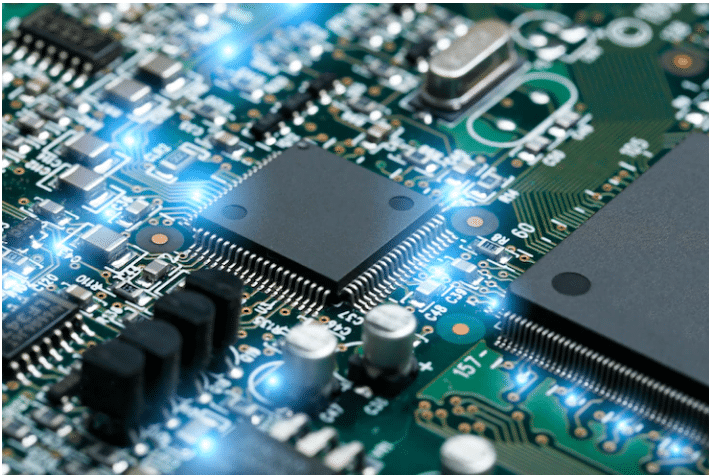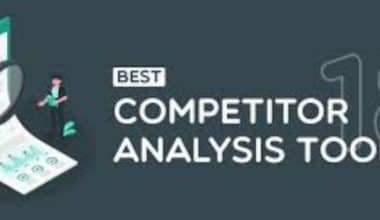A semiconductor is a material that is typically made of silicon, which has a slightly higher electrical conductivity than glass but less than pure conductors like copper or aluminum. With the addition of impurities, a process known as doping, their conductivity, and other properties can be changed to suit the unique requirements of the electronic component in which they are found.
Also known as semis or chips, semiconductors can be found in thousands of products such as computers, smartphones, appliances, gaming hardware, and medical equipment.
Note that:
- A semiconductor is a substance that conducts electricity more than an insulator but less than a pure conductor and is present in thousands of electronic products.
- Semiconductor industries look to produce smaller, faster, and less expensive semiconductors.
Who Invented Semiconductor?
The first semiconductor technology, also known as “cat whiskers,” was patented in 1901. Jagadis Chandra Bose is credited with creating the device. A point-contact semiconductor rectifier called “cat whiskers” was used to find radio waves. A transistor is a piece of technology made of semiconductors.
What Is A Semiconductor Company?
A semiconductor company or industry creates and produces semiconductors, which are tiny electronic components made of gallium arsenide, germanium, or silicon. Almost every electronic device, including televisions, computers, medical diagnostic tools, cell phones, and video games, contains semiconductors.
Furthermore, the large, cumbersome vacuum tube technology of the past has been replaced by the modern, ever-shrinking semiconductor thanks to advancements made in the semiconductor industry since 1960, allowing for the creation of smaller, faster, and even more reliable electronic devices. Therefore, electronics firms and manufacturers in the United States, Japan, China, and South Korea currently make up $400 billion in the semiconductor industry.
What Does A Semiconductor Company Do?
Historically, semiconductor manufacturers were in charge of every stage of production, from design to manufacture. But a lot of chip makers are now handing off an increasing amount of production to other companies in the sector. Recently, manufacturing-only foundry companies have emerged and are offering appealing outsourcing options. Along with foundries, the ranks of increasingly specialized chip testers and designers are beginning to grow. Chip businesses are becoming leaner and more productive.
As a result, while many semiconductor businesses handle marketing and design in-house, they opt to outsource some or all of the manufacturing. These businesses, referred to as “fabless chip makers,” have a high potential for growth because they are not burdened by the expenses related to manufacturing.
How Do Semiconductors Work?
Semiconductor devices can exhibit a variety of beneficial traits, including variable resistance, the ability to conduct current in one direction more readily than the other, and the ability to respond to heat and light. They actually perform signal amplification, switching, and energy conversion.
Therefore, they are widely used in almost all industries, and the businesses that produce and test them are regarded as reliable gauges of the state of the economy as a whole.
Finally, with semiconductor components found in a variety of consumer and commercial products, from cars to computers to mobile devices and personal electronics, the semiconductor industry is a vital sector for both the U.S. and global economies.
Types of Semiconductors
Based on the elements that are incorporated alongside silicon during the “doping” process, semiconductors can be divided into two main categories:
#1. An N-Type Semiconductor
An N-type semiconductor contains one or more pentavalent atom-based impurities, such as bismuth, arsenic, phosphorus, and antimony.
#2. A P-Type Semiconductor
A p-type semiconductor has valence layer dopants with five electrons. For this purpose, phosphorus, antimony, or arsenic are frequently used.
What Are Semiconductors Used For?
Semiconductors can be broadly divided into four types of products:
#1. Memory
Memory chips communicate with the brains of computer devices and act as temporary data storage facilities. Only a handful of titans like Toshiba, Samsung, and NEC can afford to remain in the game as a result of the continued consolidation of the memory market, which has driven memory prices to an all-time low.
#2. Microprocessors
These are central processing units that have the fundamental reasoning needed to carry out tasks. With the exception of Advanced Micro Devices, nearly all of Intel’s rivals have been forced into smaller niches or entirely different market segments due to its dominance in the microprocessor market.
#3. Commodity Integrated Circuit
These are produced in large batches for standard processing purposes and are sometimes referred to as “standard chips.” This market, which is dominated by very large Asian chip manufacturers, offers extremely thin profit margins, for which only the biggest semiconductor firms can contend.
#4. Complex SOC
System on a Chip (SOC) is the creation of an integrated circuit chip with an entire system’s capability, driven by the growing demand for consumer products that combine new features and lower prices.
The Top 7 Semiconductor Companies in The World
#1 Taiwan Semiconductor Manufacturing Co. Ltd. (TSM)
- Revenue: $72 billion
The largest semiconductor foundry in the world, which is an industry term for companies that manufacture semiconductors under contract for clients, is Taiwan Semiconductor Manufacturing Co. For clients, pure-play foundries produce integrated circuits. Taiwan Semi manufactures many semiconductor companies’ chips on their behalf.
#2 Intel Corp. (INTC)
- Revenue: $70 billion
Intel develops processors for the PC and enterprise server markets, with its largest divisions being the Client Computing Group and Data Center Group. It also offers IoT solutions, memory and storage products, autonomous driving technology, and programmable semiconductors.
The business manufactures network interface controllers, integrated circuits, and motherboard chipsets. Intel announced a plan in 2021 to make significant investments in growing its foundry business, including in the United States.
#3. Qualcomm Inc. (QCOM)
- Revenue: $42 billion
Qualcomm is a multinational semiconductor and telecommunications company that develops and sells products and services for wireless communications. The patented CDMA (code division multiple access) technology from Qualcomm is used by telecommunications firms all over the world and has been crucial to the advancement of wireless communications. Many mobile devices use its Snapdragon chipsets.
#4. Broadcom Inc. (AVGO)
- Revenue: $33 billion
For the networking, telecommunications, and data center markets, Broadcom offers software as well as digital and analog semiconductors. It offers interfaces for routers, switches, processors, fiber optics, and Bluetooth connectivity on computers.
#5 Micron Technology Inc. (MU)
- Revenue: $31 billion
Memory chips from Micron Technology are used in rewritable disc storage systems and NAND flash products. Computers, consumer electronics, cars, communications, and servers all use the company’s products.
#6. NVIDIA Corp. (NVDA)
- Revenue: $29 billion
The leading manufacturer of graphics processors for desktop computers and business servers is Nvidia. The high-end performance offered by these graphics processing units, or GPUs, is desired by cryptocurrency miners, online gamers, and professionals who use computer-aided design.
#7. Applied Materials, Inc. (AMAT)
- Revenue: $26 billion
Applied Materials is a top supplier of capital equipment used to make liquid crystal display (LCD) screens and semiconductors. High-quality silicon wafers are created using the company’s technology, and microscopic circuitry is then deposited on their surfaces.
#8. ASE Technology Holding Co. Ltd. (ASX)
- Revenue: $23 billion
ASE Technology is a holding company based in Taiwan that offers services for semiconductor assembly, packaging, and testing. Advanced Semiconductor Engineering Inc. and Siliconware Precision Industries Co., Ltd. joined forces to form the business.
#9. Advanced Micro Devices (AMD)
- Revenue: $23 billion
Advanced Micro Devices, Inc. (AMD) is a global semiconductor business that develops and produces microprocessors, graphics processing units (GPUs), and other hardware parts for computers. AMD is a top provider of microprocessors for desktop and laptop computers, game consoles, cloud and enterprise servers, and other electronic devices. They are the leading manufacturer of microprocessors for personal computers and servers. AMD offers a variety of additional products and technologies in addition to its core microprocessor and GPU businesses, such as networking, memory, and software.
#10 ASML Holding N.V. (ASML)
- Revenue: $21 billion
The Netherlands-based ASML is a market leader in providing cutting-edge lithography systems that chip makers use to add circuitry to silicon wafers. Its equipment assists chip manufacturers in making the best use of expensive wafers while enhancing chip performance.
What Is The Largest Semiconductor Company In The U.S.?
#1. Intel Corporation (The Largest Semiconductor Company in the USA)
Intel is a pioneer in the development of processor technologies and supports international initiatives. They primarily use high-performance processors as semiconductor devices.
#2. Nvidia
The American semiconductor technology company Nvidia produces Systems on a Chip (SoC) and Graphics Processing Units (GPU) (SoCs).
#3. Texas Instruments
Digital signal processors, discrete and integrated circuits (IC), calculators, and digital light processing are all produced by the leading US semiconductor company, TI (DLP).
#4. Micron Technology
Micron Technology is a manufacturer of semiconductor products such as DRAM, modules, and NAND flash memory.
#5. Analog Devices
High-performance signal processing solutions are available from Analog Devices. The business is a leader in the design and production of DSP integrated circuits, mixed-signal circuits, and analog circuits worldwide.
#6. Microchip Technology
Leading suppliers of Flash-IP, mixed-signal, analog, and microcontroller solutions include Microchip Technology Inc.
#7. Skyworks Solutions, Inc.
Manufacturers of highly cutting-edge analog semiconductors for networking and wireless telecommunications include Skyworks Solutions.
What Is An Intrinsic Semiconductor?
An intrinsic semiconductor, as opposed to p-type and n-type semiconductors, is one that has no impurities or dopants added to it. In intrinsic semiconductors, n = p, which is the ratio of excited electrons to holes.
Which Country Has Most Semiconductor Companies?
Taiwan. The world’s top producer of raw semiconductors is the tiny East Asian nation of Taiwan, whose diplomatic status is being contested by China. This has a lot to do with Taiwan Semiconductor Manufacturing Co.’s efforts.
Who Is The Largest Chipmaker In The World?
Without mentioning Intel Corporation, the largest chipmaker in the world by production output, any discussion of the semiconductor industry would be incomplete (NASDAQ: INTC).
Who Buys The Most Computer Chips?
China consumes more than 75% of all semiconductors sold globally but only contributes 15% to production. Meanwhile, while Apple is by far the biggest chip buyer in the world, its expenditures decreased last year, and that trend may continue as the company switches to application processors that were designed in-house.
Where Do Semiconductors Come From?
Microchips and integrated circuits (ICs) are frequently made of germanium, pure silicon, or compounds like gallium arsenide. These components contain minor impurities that affect the conductivity of the material.
Who Sells The Most Computer Chips In The World?
The biggest producer of semiconductor chips is Taiwan Semiconductor Manufacturing Company Limited (TSMC). Around 90% of high-performance chips worldwide are produced by this company. Additionally, it has a revenue share of over 50% of the global semiconductor foundry market.
BEST TECH JOBS: Highest Paying Jobs, Remote, Introverts & Without Degree
What To Do In An Electrical Emergency And How To Get Power Back Quickly
EHR: What Is an Electronic Health Record, Benefits & Difference
ELECTRICIAN: What Electricians Do, How Much They Make & How to Become One






